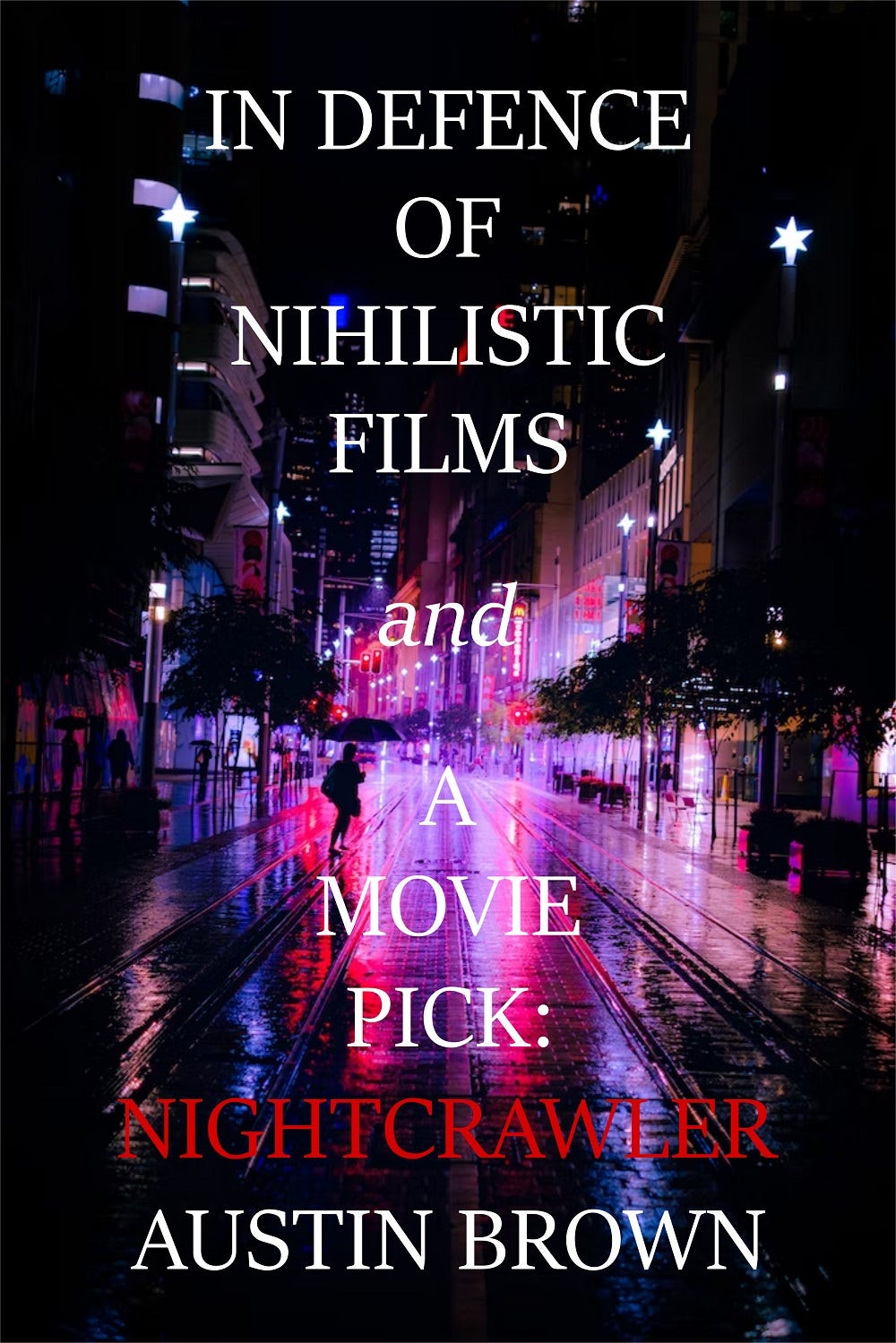In Defense of Nihilistic Films and a Movie Pick: Nightcrawler

Nihilism is a blackness of night without so much as a pinprick of light. Meaning and pleasure take whatever shape a man chooses. There are no good guys, there are no bad guys. There is no dawn of justice waiting to break on the horizon. Evil is merely one shade of gray lost in an infinite spectrum of grays. Life is utterly relative.
In view of this, one might ask whether or not a film has any merit if it is drenched in nihilistic themes. Or, to state the matter more provocatively, should a Christian dare enjoy a nihilistic film?
It’s a fair question, and not a little tricky.
Here I should make a candid confession. As a lover of stories, I naturally and readily find all types of tales, even more nihilistic ones, if done well, compelling, even enjoyable. Naturally, my fear is that I am betraying something of a sadistic mind with this admission. This stems, in part, from my firm belief that all good things come from the Father of lights (James 1:17). Conversely, one might say that all bad things crawl out of the vile wellspring of sin. Nihilism is a very bad thing, therefore nihilistic movies must be very bad things.
The above logic harbors an alluring simplicity. Yet for all its apparent force, I would argue that there is a place for nihilistic films—that there can be value in watching them.
Sometimes a shard of light is seen to shine more brightly against a very dark canvas. This is more than evident in God’s Story. The very fabric of our world has been doused in sin, and as a result, some among us embrace the darkness, ultimately and finally, suffering destruction. This is to say that their life is radically tragic. There is no happy ending. There is no bright light of hope and redemption for them.
When set in the larger framework of God’s dealings, such instances of bitter tragedy nevertheless prove meaningful. History is a stage whereby we are obtaining the knowledge of good and evil. God is demonstrating that sin in all its awful variety purchases misery and ruin. In so doing, He is using such evil to more greatly magnify His glory (Romans 9:22-24; Acts 2:23). One might say that our world is exhibit A (Eph 3:10). None of this, of course, justifies our enjoyment of nihilistic films as a kind of rejoicing in evil; but it does mean that they can serve as powerful tools for impressing upon us the bitter outcome of sin, whatever its peculiar blend. They can serve a larger purpose—much like God’s own utilization of sin in pressing upon us its utter bankruptcy (Romans 6:21).
Here I should hasten to add a sharp qualification. This is not a justification for watching pornography or anything of the like. There are plenty of things we should not “learn” about through film. Let the Word of God be a firm guide here. My point is that there is a place for bleak, largely hopeless films that powerfully portray the folly of sin. These types of productions, if done well, will not only evoke a sense of thankfulness to God for salvation, but they can also serve to instruct and sharpen the light, even if that light is not given direct space to shine on screen. We bring an overarching narrative to the film and digest it in view of that larger panorama. Thus, one might say that dark movies can function as a kind of fable, if you will, portraying some bit of wisdom or insight, providing a cautionary tale.
You would be correct, for example, to be disgusted by the mother in The Florida Project. But such disgust provides a fertile context for a reflective conversation about motherhood, life, choices, evil and its effects on children.
Consider this part of my rationale for recommending certain nihilistic films. If you demur, I respect that, having no interest at all in changing your mind. Life has enough darkness to instruct; movies and novels are not required.
If you are still with me, consider the movie Nightcrawler. To this list could be added such films as No Country for Old Men, or Oslo August 31st, or Joker, or There Will Be Blood. But my guess is that many of you are familiar with at least some of those picks. In the case of Nightcrawler, it tended to fly under the radar of moviegoers.
In this gritty tale of unbridled ambition, Louis Bloom (played brilliantly by Jake Gyllenhaal) scavenges the darker corners of Los Angeles with a camcorder, hoping to capture the next tantalizing scene of suffering, whether it be gruesome accidents or disturbing crimes. Willing to do anything for the “next great shot,” we watch him crawl his way into the good graces of a local news outlet and grow in deviancy.
It’s a powerful exposé of depravity, conjuring as much intrigue as it does horror throughout the film. One need only watch a handful of Mark Laita’s soul-crushing interviews on YouTube (see “Soft White Underbelly”) to know that such broken figures exist in our world. Or, sadly, like most of us, we’re aware of such depravity because it’s found in the branches of our family tree—or the branches of our own hearts.
Whatever the case, if your constitution is sufficiently robust, and you don’t mind dipping a toe in the dark of nihilism to catch something of its terrible vision, Nightcrawler is a movie I would recommend for your consideration, especially if you have a spouse or group of friends to discuss it with afterward.
“Happy” watching.
The post In Defense of Nihilistic Films and a Movie Pick: Nightcrawler appeared first on Kuyperian Commentary.

